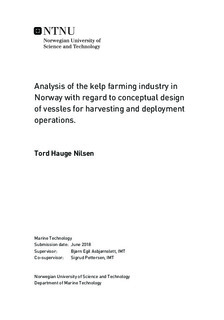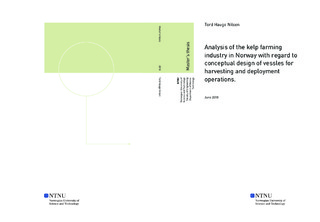| dc.description.abstract | Kelp farming is an industry that has been considered to have a large potential in Norway as well as North-Western Europe. Large areas of ocean, wich otherwise would be empty, can be utilized for production of enormous amounts of biomass. This biomass will then be produced without the use of fresh water, fertilizers or valuable agricultural land. Amongst the end-products imaginable we have biofuels, feed, food, fertilizers and several valuable chemical components. In spite of this potential, has the industry in Norway not come very far in terms of volumes and technology. Today, most of the kelp cultivation in Norway consist of small-scale food production through labor intense methods.
This thesis attempts to analyze and describe the kelp farming industry and the potential future development of the industry with regard to identifying relevant information for the design of one or more vessels which can perform work operations in the kelp farming industry. With a foundation in ideas from the RSC method, important factors that will play an important role in the further development of the industry, have been identified. These factors have a strong interrelationship and will not develop independently but are here discussed separately. The identified factors are: Development of markets for the different potential end-products, development of harvesting and deployment technology, development of processing technologies, development of on-growing systems, development of temporary storage systems, development of energy- and cost-efficient conservation methods, the environmental effects of kelp farming and the effects of seasons and growing locations on the chemical composition, growth and biofouling on kelps. Most of these factors are still poorly understood. This makes it difficult to make meaningful decisions regarding design of concepts for a large-scale industry in a somewhat distant future. At the moment focus should instead be on developing the technology and methods necessary for the industry to take the next step into a moderately up-scaled and more cost-efficient industry.
The factors that were identified as the most important ones for up-scaling of the industry in the short term are efficient harvesting technology and acceptable temporary storage methods. Harvesting is the clearly most labor-intensive process in kelp farming and an up-scaling of the industry will depend on this operation being performed in a more efficient manner. When the kelp is harvested, it must be stored while waiting for, and during, transport to shore. At the moment, no methods that allow for large amounts of kelps to be stored densely without unacceptable quality loss, have been tested in a large scale. Refrigerated seawater cooling and ensiling are the methods that show greatest promise.
It is concluded that a vessel concept should have kelp farming as a by-function in an early phase. The harvesting season is very short, and the vessel should instead have operations that it can perform in the rest of the year as its primary function. It is also harder to compete in other markets than the kelp market, in which a vessel would be the first of its kind, and the vessel therefore should be optimized with regard to other functions. A vessel that is not dependent on the success of the kelp industry will also be an investment with much lower risk than a vessel primarily designed for kelp farming operations.
For further up-scaling the most important areas of research are considered to be conservation and bioprocessing. It is important that the kelps can be processed in a cost-efficient way that utilizes as much of the biomass as possible. It is also crucial for the bioprocessing that the kelps can be stored over longer periods without having to go through energy demanding processes like freezing and drying. This will allow for the processing to be distributed over longer periods, despite the short harvesting window. These topics are already being studied several different places in North-Western Europe especially and the progress should be monitored closely. | |

